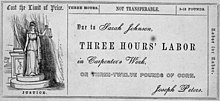Mutualism (economy)
The mutualism ( lat. Mutuus. "Mutually reciprocal" to double mutuellisme of mutuel ) refers to a social reform movement that the primary means of preserving saw their interests in the mutual economic support of the workers.
origin
The name goes back to the association of workers and artisans, which formed in large numbers in France in the 1920s and mostly adopted the name and character of societies for mutual support (Sociétés de secours mutuel) , since this is the only one legally tolerated Form of workers' organizations. The best known was the association of home weavers, founded in Lyon in 1827 , who called themselves mutualists (mutuellistes).
These proletarian minor masters, who were severely disadvantaged by the publishing system , founded an association to defend their interests in solidarity . In accordance with their statutes, they committed themselves to providing material support for members who were in need through no fault of their own from a fund, whose funds were mostly obtained through fines , to provide free looms to professional colleagues and to exchange production experience; In addition, they also waged the legally illegal struggle against the increase in raw material prices and the reduction in unit wages for their labor products.
As a modern replacement for dissolved guild organizations , mutualism also had clearly conservative features. He tried to compensate for the loss of privileges , self-determination and solidarity of the craftsmen through the externally determined division of labor since industrialization .
history

The mutualists played a special role in the first uprising of the silk weavers in Lyon in 1831, when the weavers rose up with the slogan "Live by work or die in battle". After that, in Lyon and other cities in France, the number of mutualist organizations skyrocketed, many of which also began organizing illegal trade union struggles. The impending prohibition of their activities by the new association law of April 1834 gave the impetus for the second Lyon uprising, which assumed a political character.
In other countries, too, mutualism emerged as an early form of proletarian solidarity and mutual aid against “ capitalist exploitation ”. In France, the height of mutualism had passed after the second Lyons uprising. As far as it continued, it lived on as a reform movement that was limited to cooperative efforts. One reason for this was that polemics against private property found no consensus among those affected in the medium term .
Sociological theory
Following on from the Lyon tradition, which he got to know personally in 1843 - and probably also inspired by his own experiences at the Ecole mutuelle , a private school where the children taught each other, i.e. the older the younger - Pierre-Joseph Proudhon adopted the principle of Mutualism as the theoretical basis of his conception of socialism .
According to Proudhon, who did not recognize the central control of a socialist society, but idealized the spontaneity of simple commodity production, all social relations should be regulated according to the principle of voluntary reciprocity. By this he understood the exchange of products according to the simple law of value , the securing of equality and fairness of this exchange by granting interest-free credit to all producers to procure the means of production they need, and the voluntary, mutually agreed formation of cooperatives and collective agreements.
With this, Proudhon concentrated his conception of socialism on a base of small producers. Since he called his system mutualism , his followers in the French labor movement were called mutualists . Insofar as they belonged to the First International as left Proudhonists , its 1871 statute forbade them, like all other sections, to use such names.
The sociologist Émile Durkheim based his considerations on solidarity, among other things, on the phenomenon of mutualism.
further reading
- Marion Schweiker: Pierre-Joseph Proudhon's mutualism as the basis of a federal-democratic reorganization of Europe . Cuvillier, Göttingen 1996, ISBN 978-3895887352
- Peter Decker, Konrad Hecker: The proletariat. Politically emancipated, socially disciplined, globally exploited, nationalistically corrupted . Objektpunktverlag, Munich 2002, ISBN 3-929211-05-X
- Peter A. Kropotkin : Mutual help in the animal and human world . Nevertheless publishing house , Grafenau 1993, ISBN 3-922209-32-7
- Hector Zoccoli, The Anarchy: Your Propagators - Your Ideas - Your Actions. Attempt of a systematic and critical overview as well as an ethical assessment . (See on this: The economic criticism of PJ Proudhon: The theoretical standpoint of Proudhons , page 73. / The current antagonism of capitalist civilization , p. 89. / The organization according to industrial agreements , p. 102 / Class differences and class rule , p. 211 / Political and economic organization , p. 220 / The elimination of wage labor , p. 244 / The economic freedom: The freedom of production and sales of goods , p. 274. / The money monopoly , p. 274. / The land monopoly , p . 276 . / The tariff monopoly , p. 276. / The patent monopoly , p . 277. / The trusts , p. 278 / The principle of dependence of capitalist society , p. 297). Authorized translation from the Italian by Siegfried Nacht (pseudonym for: Arnold Roller). 1st edition, Maas & van Suchtelen, Leipzig and Amsterdam 1909.
Further meaning
Mutualism further describes a financial hypothesis, according to which, with relatively the same tax burden, every taxpayer would also make money sacrifices that others would benefit from.
See also
Web links
- "Thoughts on the Solidarity Economy Congress by Werner Ruhoff" . February 17, 2007 release
- Brief information about mutualism (economics)